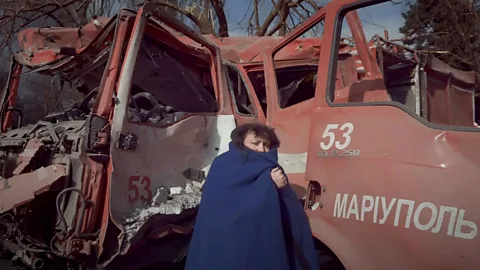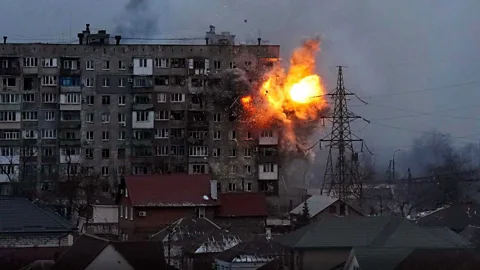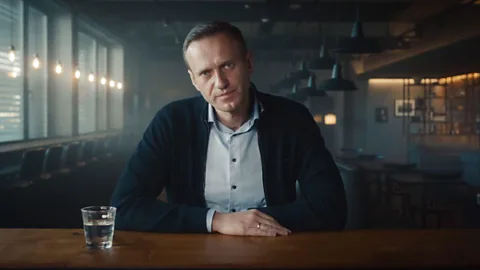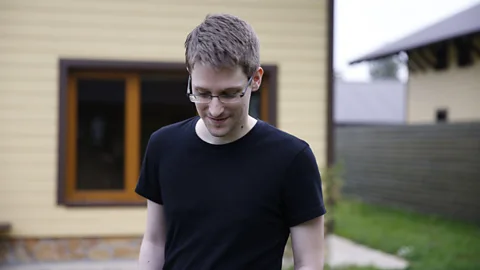20 Days in Mariupol: The Ukraine doc set to follow Navalny Oscar win
 AP Photo/Alamy
AP Photo/AlamyFavourite to win the best documentary Oscar, 20 Days in Mariupol shows Russian troops advancing into the Ukrainian city in March 2022, and might help to galvanise viewers.
Buildings are reduced to rubble, including a maternity hospital. Citizens flee, or fall victim to the bombs, or, in desperation, start looting their neighbours' shops. Soldiers hunt for reporters.
This was the fate of one of Ukraine's greatest cities, the eastern port of Mariupol, and 20 Days in Mariupol is the heartrending and often punishing documentary made on the frontlines of war by photojournalist Mstyslav Chernov. It’s now the favourite to be awarded the best documentary Oscar, days after Ukrainians mark the second anniversary of Russia's invasion.
Last week, the Pulitzer-prize winning Ukrainian journalist was awarded the Bafta for best documentary. He tells BBC Culture that he dreams of holding up the winning Oscar too, but only as a public tribute to those he met and filmed in the doomed city in March 2022, and as an opportunity to highlight Ukraine's continuing occupation.
"I owe them to do everything I can to make sure their story isn't forgotten," he says. "That's why we're very determined to keep going, trying to reach the final goal of getting the Oscar, because that's just going to guarantee, at least in my mind, that no one will ever forget that."
Chernov and his colleagues were part of an Associated Press news team when the Russians besieged the eastern port city of Mariupol. Tens of thousands of civilians were killed. The documentary shows the destruction in punishing detail, depicting the aftermath of the bombing of a maternity hospital, during the 20 days they remained there as the only international reporters still operating in the city. The documentary occasionally feels like it has a thriller element, as Russian soldiers hunt for reporters and the team are helped by medics, Ukrainian soldiers and civilians.
 AP Photo/Evgeniy Maloletka
AP Photo/Evgeniy MaloletkaIt also shows them struggling with the lack of power and internet to try to send their footage and tell the global news audience about the destruction. Viewers are immersed into the helplessness, fear and anger of Chernov and Mariupol's citizens as the Russian troops advance into the heart of the city.
"We really wanted the audience to feel that much," Chernov admits. "We wanted the audience to be there in the city, which was dying day by day, how it was to be trapped there and not to have a way to leave."
The visibility of the Oscars
This is the second year running that the race for the best documentary Oscar feels linked to political events far away from Hollywood. Last year's winner, Navalny, is a documentary by Canadian filmmaker Daniel Roher. He gained unprecedented access to the Russian opposition leader Alexei Navalny, who died in prison last week, capturing his poisoning by the nerve agent Novichok and his decision after his recovery to fly back to Russia and face certain arrest.
So visible is the act of winning an Oscar that Roher told the BBC last year, when Navalny was in prison, that "we know the Kremlin is paying attention to the film, we know already that President Putin is personally annoyed by this document of history, and what the film has achieved.
"I am out here every single day, talking about Navalny because I believe that there is a relation between talking about him and promoting his name and his survival. All of the awards seek to further that goal."
 Fathom Events/ Warner Bros Pictures
Fathom Events/ Warner Bros PicturesSince Navalny's death, the film has once again become an object of interest, part of renewed media coverage of Russia's invasion of Ukraine, which had been slipping away from news front pages as new conflicts, particularly in the Middle East, occupied media and public attention.
Chernov also sees 20 Days in Mariupol as a tool to keep the world from losing interest in the war in Ukraine. "This gives us a wider audience because there's still so many people who don't see what is happening in Ukraine, who didn't pay attention, or who forgot about it, because it just disappeared from the news, and everybody moved on," he says.
"So, the only way to – I don't want to say fight, because we're not soldiers – but the only way to resist that oblivion and the only way to make sure that the stories of people who were in Mariupol will be preserved in time and history, is to make a film.
"The frustration of Ukrainians is coming from the idea that the world perceives this invasion now as some kind of normality," he adds. "I can't imagine if Russia invaded another European country and after two years of this invasion, after thousands of people being killed by Russian bombs, the world will say, 'well, it's just okay, we just should get used to that and let's move on.' I think it would sound like an absurd suggestion."
But he hopes the craft of documentary-making is also uppermost in the minds of those who might award the film the Oscar.
"It's not enough to be there at the right time, or to hit the right place politically," he argues. "It's very important that the craft that goes into building a story, you cannot just throw important footage on the audience and let them figure it out themselves. We needed to make this story cohesive, to make sure that the audience stays engaged in a story or does not get pushed away by the abundance of violence or tragedy. And at the same time, we needed to stay very thoughtful on the horrors of war, on the reality of war.
"To find that right balance takes a lot of careful planning and searching for vision and the right tone, and it goes for all parts of filmmaking and camera work and just the way you tell the story with voiceover. I would say there is much more to be done than just to be urgent to get to such a high recognition as an Oscar."
Chernov points out that since he released his documentary, news audiences have watched another civilian population suffer, with many of their homes reduced to rubble.
"Mariupol has become a symbol of every other city that is getting destroyed right now, over the two years since I made it, it's gained more meaning than I ever thought it would," he says. "With everything that's happening in Gaza right now, there's another whole layer of symbolism to what the civilian population goes through in war, and how war is destructive and unacceptable in this way."
But he warns against the conflicts in Ukraine and the Middle East being pitted against each other as to which one might be most worthy of coverage.
"It actually bothers me because it feels like manipulation at times," he says. "I can see people trying to oppose these two wars. They try to say, 'well, look here. No, no, no, look here.' And they try to compare them. It's almost like we have to decide whose life is more important. All lives are equally important, and all the tragedies are equally deserved to be told in as much detail as possible. We all understand that all wars in the world right now are connected, in one way or another, on some level. But at the same time, we also have to recognise that these are two very different wars. They have different cultural contexts, they have different historical context, and plainly juxtaposing them or comparing them to each other is oversimplifying the matter."
 HBO/Participant Media/Praxis Films
HBO/Participant Media/Praxis FilmsOver the last three decades of Academy Awards for best documentary, many of the winners have focused on political events or political figures, from Laura Poitras's Citizenfour (2014), which documents an encounter with whistleblower Edward Snowden, to Michael Moore's Bowling for Columbine (2002), which examined a school shooting and US gun laws. A winning documentary made on the frontline of a war would be a first in modern Oscar history. (Oscar-winning World War Two documentaries, such as 1943's Desert Victory and 1945's The True Glory were made by the British and US Ministries of Information.)
Chernov, who's currently based in Germany, says he now wants to make another documentary about the war in Ukraine, and to find new ways of elevating the genre.
"I feel that just to be able to really show people what war is like, you have to find the right cinematic language to lead them through the story," he argues. "So I am working on finding the right visual language to do that because I feel that a lot of modern documentaries about war lack this realism. They get overproduced, although they're all incredibly important. But I think talking about war as it really is can be chaotic, unpredictable, destructive and you also have to stick to a certain visual language to be able to take the audience there."
The Associated Press team eventually escaped Mariupol with the help of Ukrainian soldiers, shortly before Russian forces bombed a theatre that was being used as an air raid shelter for civilians. Chernov explains that he carried so-called "survivors' guilt" out of the city with him as well.
"Everybody I interviewed shared it too. Across all these very different people with different circumstances, they all had that feeling of survivor's guilt – that they'd got out, and other people didn't, and they died. I think we really felt that when we heard about the bombing of the theatre, and we knew that we couldn't do anything about it.
"There were thousands of cars that were leaving the city. We all felt guilty in some way. And that is a very strong drive." When propaganda is used to try and sway the outcome of a conflict, documentaries like 20 Days in Mariupol or Navalny can be a powerful way to fight back. "I still feel that I owe this to people of Mariupol who helped us to survive, to those who lost everything, including their lives. I just owe them to do everything I can to make sure that their story will not be forgotten. And that's what we are doing right now. And that's why the film exists."
If you liked this story, sign up for The Essential List newsletter – a handpicked selection of features, videos and can't-miss news delivered to your inbox every Friday.
